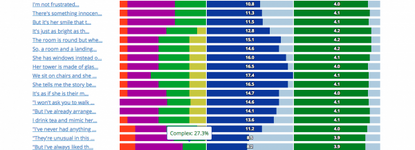From an editor’s viewpoint, writing is about balance.
The best fiction writing tips I've received (so far)
In summary:
1. Show, don't tell
2. Avoid adverbs
3. Rethink passive voice
4. Edit out filter words
5. Vary sentence length
6. Look out for repetitive starts
7. Recognise your overused words
8. Make dialogue count
What are the best tips/advice you've received? Have any transformed how you write? (For me it was #2).
#1, Showing is sensory-driven and takes more words. Another axiom of writers:
Don’t use three words when one will do. The two conflict. Show is important. If you just need to say the moon is shining, then say it. Tell can move the story forward at a pace that show will slow.
#2 Adverbs exist, they have a purpose. Use an adverb when it has a purpose without fear. Avoid lazy writing by using adverbs.
#3 Passive voice has it's place. "To be or not to be", that is the search for passive voice. That is Shakespeare's jab at those who fail to utilize a writers tool.
#4 There seems to be a feeling among critics - they think filter words are bad and don't realize they have merit. Oops, I used four filter words in that sentence. I should have said - Critics say filter words are bad. If you can't say it any other way, use a filter word and don't
feel bad about it.
#5 Absolutely, that's balance. But, for impact. Use multiple short sentences. To finish a complex thought, use multiple long sentences grouped until the thought is complete. The rhythm of the prose is dictated by the content revealed to the audience.
#6 I agree, especially "he" and "she".
#7 We tend to used the words we know resulting in overuse. This is a tough one.
#7a Repetition - Repeating the same word within a short period of time is a bad thing. Shakespeare enjoyed taking jabs at this axiom. "Double, double toil and trouble; Fire burn and caldron bubble. Fillet of a fenny snake, In the caldron boil and bake...", (forgive me if I got this wrong.)
Repetition of words has it place at times.
8 - I would like to say, "make dialogue real".
8a - Exposition in dialogue should fit the context.
#9 Agree
#10 Agree
#11 Agree - note #9 makes this one tough or visa versa
These are just my opinion. Writer's tips, guidelines, rules or axioms are there to help writers improve in their trade. With experience, a skilled craftsman will break the rules in a fashion that makes their voice unique.

